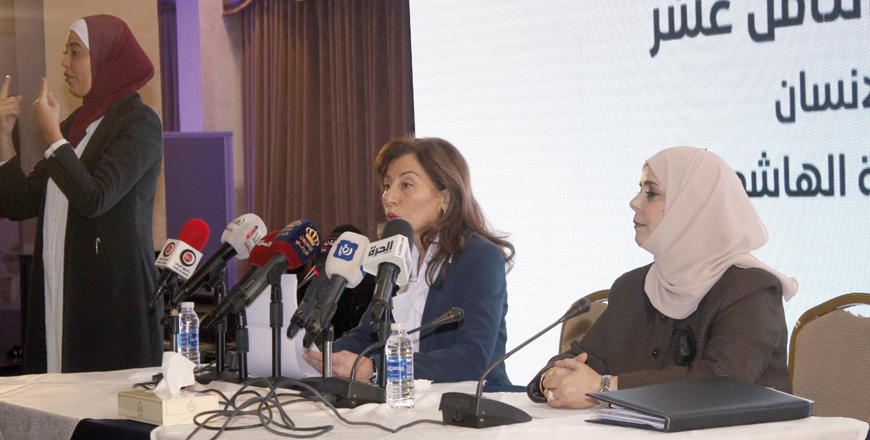You are here
National rights watchdog releases 2021 report
By JT - Feb 15,2023 - Last updated at Feb 15,2023

Chair of the National Centre for Human Rights’ board of trustees Samar Al Hajj Hassan speaks during a press conference in Amman on Wednesday (Petra photo)
AMMAN — The National Centre for Human Rights (NCHR) on Wednesday published its 18th annual report on the state of human rights in the Kingdom for 2021.
The centre’s board of trustees chair, Samar Al Hajj Hassan, told a press conference that the report recommended policies to uphold social justice and improve the distribution of wealth and services in a manner that promotes sustainable development and lowers unemployment and poverty, according to the Jordan News Agency, Petra.
According to Hassan, the report recommended incorporating human rights concepts into educational curricula and building partnerships with leaders and influencers across the Kingdom’s governorates.
Hassan emphasised the necessity of reviewing public freedoms and restrictions in accordance with the Constitution and global human rights norms.
NCHR facilitator Reem Abu Dalbouh said that the number of people held in administrative and judicial detention dropped dramatically in 2021, according to statistics provided by various law enforcement agencies.
Moreover, she added, no death row inmates were executed in 2021, a year in which the State Security Court and Grand Criminal Court handed down an additional 31 death sentences.
The centre made 60 visits to correctional facilities in 2021, which saw the incarceration of an additional 18,954 people, up from 17,708 the previous year. She did note, however, that this does not represent the total number of inmates at any given time, as it accounts for arrests and continuous releases that occurred throughout the year.
According to Abu Dalbouh, no complaints regarding torture or cruel, inhuman, or degrading treatment of detainees in primary detention facilities were filed with the police public prosecution for the third year running.
Regarding the freedom of thought, expression and access to information, Abu Dalbouh indicated that issues remain with the application of Article 11 of the Cybercrime Law No. 27 of 2015.
She mentioned that there were advancements in civil and political rights in 2021, pointing to the creation of a Royal committee that laid the groundwork for bettering political life and enhancing the executive branch’s execution of its duties.
According to Abu Dalbouh, the centre observed an expansion in the use of technology in court proceedings in 2021, but there were “tangible challenges” with conducting remote litigation.
She also mentioned the 2021 approval of the tribal Jalwa document, which aims to eliminate the negative effects of traditional practices that restrict people’s freedom of movement and residence. Jalwa is the forced relocation of a killer’s family from their home if they happen to live close to the family of the victim.
According to the report, the amendment to the Anti-Human Trafficking Law, which classified organised panhandling as a form of human trafficking, helps prevent the exploitation of children involved in begging.
When discussing the rights of vulnerable populations, Abu Dalbouh highlighted legislative amendments that helped advance and protect the rights of women, people with disabilities and the elderly.
She added that the report highlighted the policies and actions taken to protect women’s rights, particularly in cases involving women who worked in agriculture, women who were victims of shelter-based violence, women who were murdered and women who were married at a young age.
Related Articles
AMMAN — A Royal Decree was issued on Tuesday appointing the new members of the National Centre for Human Rights (NCHR) board of trustees.
AMMAN — Chairman of the National Centre for Human Rights (NCHR) Irahil Gharaibeh on Sunday entrusted Reem Abu Dalbouh, member of NHCR board
AMMAN — A recent workshop to commemorate Nelson Mandela International Day, annually marked on July 18, has called to reduce the number of in















